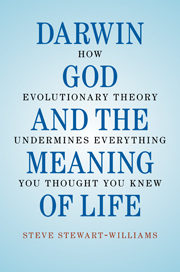 Darwin, God and the Meaning of Life
Darwin, God and the Meaning of Life Book contents
- Frontmatter
- Contents
- Acknowledgments
- 1 Darwin and the big questions
- Part I Darwin gets religion
- Part II Life after Darwin
- Part III Morality stripped of superstition
- 11 Evolving good
- 12 Remaking morality
- 13 Uprooting the doctrine of human dignity
- 14 Evolution and the death of right and wrong
- Suggestions for further reading
- References
- Index
14 - Evolution and the death of right and wrong
Published online by Cambridge University Press: 05 June 2012
- Frontmatter
- Contents
- Acknowledgments
- 1 Darwin and the big questions
- Part I Darwin gets religion
- Part II Life after Darwin
- Part III Morality stripped of superstition
- 11 Evolving good
- 12 Remaking morality
- 13 Uprooting the doctrine of human dignity
- 14 Evolution and the death of right and wrong
- Suggestions for further reading
- References
- Index
Summary
Although the shrewdest judges of the witches and even the witches themselves were convinced of the guilt of witchery, this guilt nevertheless did not exist. This applies to all guilt.
Friedrich Nietzsche (1974), p. 216Morality is a collective illusion of the genes. We need to believe in morality, and so, thanks to our biology, we do believe in morality. There is no foundation ‘out there’ beyond human nature.
Michael Ruse (1995), p. 250Practise random kindness and senseless acts of beauty.
Bumper stickerWhat's the big deal?
What's the big deal about evolutionary theory? Why do Creationists make such a fuss? In one sense, the answer is obvious: as we saw in earlier chapters, the theory contradicts a literal interpretation of Genesis and is therefore a direct threat to the Creationist worldview. This doesn't quite answer the question, though. Creationism, at least in its Young Earth form, is also inconsistent with geology and plate tectonics and the Big Bang theory and archaeology and linguistics and indeed any other area of human knowledge that traces its object of study back further than 6,000 or 10,000 years. It is interesting and strange that there is such a strong anti-evolution movement, but no equivalent movement aiming to stifle geology or Big Bang cosmology. The scientific revolution that really seems to get people hot under the collar is the Darwinian revolution. Our question, then, is why do Creationists worry almost exclusively about evolution?
- Type
- Chapter
- Information
- Darwin, God and the Meaning of LifeHow Evolutionary Theory Undermines Everything You Thought You Knew, pp. 280 - 308Publisher: Cambridge University PressPrint publication year: 2010


